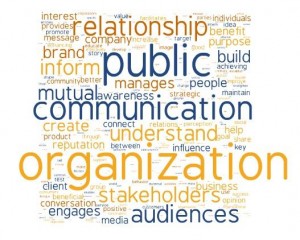Rebecca’s experiences as an editor, marketer and analyst with the Altimeter Group, make her a perfect expert resource for our Influencers Who Inspire series. She is also the author of The Truth About Search Engine Optimization and most recently, Content Marketing.
What is your favorite outdoor activity in the summer and where do you recommend going to do it?
Hot weather and I are not the best of friends. Aquatic is my way to deal. Swimming laps, bodysurfing in the ocean, or scuba diving (a longtime passion) - if it’s summer, look for me near the water!
You have spent parts of your career as an analyst, an editor and an author; which of these positions is/was the most rewarding? If you can’t pick one, what are/were the highlights of all three?
I really view all these positions as a continuum. I’ve spent my career exclusively in media, first film, then television, then digital - with a bunch of print experience sprinkled throughout (periodical and book publishing). My job has always been to scrutinize the media landscape, chart its growth, and how to connect with consumers. I also have substantial experience as a marketer (I don’t just tell them what to do - I’ve done it, too!). Admittedly, my marketing experience is confined to media as well: film and television. So basically, it’s been all media, all the time.
The most rewarding part is easy. It’s been being there as one of the most important developments in the history of media and communications has taken place and taken shape. Undoubtedly, the most exhilarating part of my career has been experiencing and watching the rise of digital channels: the opportunities, the pitfalls, the disruption and the possibilities are endlessly fascinating. Sometimes you’re just in the right place at the right time, right?
As an editor and analyst you regularly hear from PR representatives pitching you for meetings. What makes a pitch or briefing request stand out to you and /or prompts you to respond quickly?
Easy - the ones that indicate the person pitching has done their job. They know who I am, what I cover, and they tailor the pitch accordingly. You would not believe how many pitches I get about a new hotel opening in Tulsa, or executive hires in the meatpacking industry. My contact information is ‘out there’ in lists sold to the types of spray-and-pray PR firms that give the industry a bad name. The concept of “know your audience” isn’t a new one, but it’s what matters most. It’s also critical to differentiate “pitch” from “press release.” Digital changed the press release. Once the news in on the wire, it’s out there. Don’t ask me [journalist hat on now] to cover it. You broke your own story.
Digital marketers want to know — with the masses of new social marketing tools, platforms, buzzwords and best practices — how do you manage to stay current?
All research, all the time. Really. I subscribe to over 200 RSS feeds and scour them all day long. I stay in the traffic. Every week I have dozens of meetings and briefings with people and companies in the industry. It’s a full time job, and then some, and it requires a lot of focus. In other words, you have to concentrate on what matters to your area of coverage. I don’t look at ALL of social media, for example. My arena is the marketing and media aspect of those channels. I leave deep dives on other aspects to my very capable colleagues.
How do you filter the news? What news sites or influencers do you visit/follow as your go to resources for news content to share each morning? (Do you have a news outlet as your homepage or do you search Twitter for keywords that are meaningful to you?)
As I mentioned above, my RSS feeds are my homepage. When Google folds Reader, it will feel as if the internet is broken for a while. I’m currently experimenting with replacements such as Reeder and Feedly. There are also people I follow very closely on Twitter and Facebook to stay abreast.
In your upcoming keynote at the Banff Media Festival you will talk about Content Marketing in the form of the Paid+Owned+Earned Media Ecosystem. With content lines blurring more and more, who do you see as the ultimate keeper of the content within an organization?
Funny you should ask, because after I completed a research report (co-authored with my colleague Jeremiah Owyang) on the convergence of paid, owned and earned media, I worked on a just-published piece of research entitled “Organizing for Content.” This research deals exactly with the question, “where should content live in the org chart?” Precious few companies have a an actual content division, yet marketing, PR, communications, community, social media and a myriad of other company components are invested in finding, creating and disseminating content. I invite your readers to download the report, which outlines six frameworks for enterprise content orchestration.
In your opinion, what has been the most important change in SEO tactics over the last few years? How do those changes impact the way we should think about content marketing today?
When it comes to SEO, the fundamental things apply. Good content, well-written, keyword-conscious, and don’t spam or be blackhat. I was fascinated last year when I conducted research into WHY major brands engage in content marketing. In 57 interviews with really major companies (e.g. Coke, IBM, ToysRUs, Adobe, etc.) only one single brand (Nestlé) mentioned SEO as a reason behind content marketing. My instinct is this isn’t because SEO is unimportant - au contraire - but because it’s no longer channel du jour. Like email (which, by the way, not one single brand mentioned - and what’s in an email if not content?), SEO is becoming a background channel. Like wallpaper - there, but no one’s really talking about it anymore. They’re looking at mobile, social, video. That’s fine - but beware Bright Shiny Object Syndrome, which can cause you to ignore basics and fundamentals.
What one piece of advice (perhaps from your most recent book on the topic) would you offer to a marketer starting a content marketing campaign today?
Strategy before tactics! We’ve seen this occur again and again. A new technology or channel is launched and someone says, “Hey! We need a [Facebook page, YouTube channel, Twitter presence, etc.]. A smart marketer counters with “Why?” What’s the goal? What are the required resources? The budget? How will we achieve it? Produce it? Measure it? Who’s the audience?
On a lighter note, we noticed that you tweeted the tongue and cheek Onion post, the other day, about how much people “love” being sold by sponsored content like videos on publications’ websites. Just for fun, can you share with us your favorite example of sponsored content gone wrong?
Wow - you just reminded me of something that goes way back in my career, back in the 90s when I ran global marketing for a major cable TV network. I came into the office on a Monday morning following the weekend when Princess Diana was killed in a car crash. A rival network was sponsoring a touring exhibit of her gowns. Across the back cover of a major magazine was splashed their ad, with the banner headline: A Dress to Di For!
Lastly, when you venture out of NYC for business travel what is the one thing you take with you, the one thing you can’t wait to leave behind and the one thing you can’t wait to come home to?
1. Laptop
2. Hmmm…maybe my MTA Metrocard?
3. It’s a tie: the cats and the boyfriend
Interested in learning more? Please leave any questions or comments for Rebecca below. You can also catch up with her at the Altimeter Group website or follow her on Twitter.


